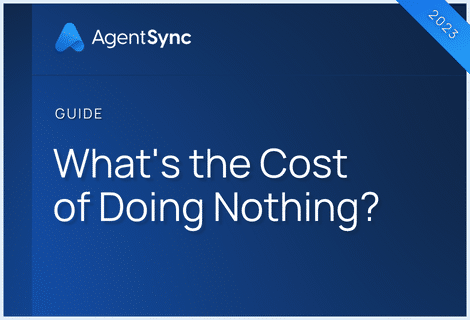

An agency changing its tax identification number (TIN), or employer identification number (EIN) may feel like it’s starting over, but breaking down the necessary steps for changing TIN can make it less difficult.
States have different protocols for maintaining records and regulating businesses, so the business administrator who finds themselves filing an agency’s change in tax ID may want to buy a big ole bottle of ibuprofen. (Because it’s a headache. Get it?)
Keep in mind before we dive in that we’re not medical professionals. We’re not tax people. And we’re not lawyers. So, while this is a good place to start your research, if you have questions about your specific circumstances, hit up one of the aforementioned pros who can give actual personal-level advice.

But if you want the high level informational stuff, keep on reading.
First, if you have an agency that is more than a sole proprietorship, you likely have an employer identification number, or EIN. An EIN is a specific tax identification number that designates a business entity. “TIN” we’ll use interchangeably for this blog, but a TIN definition technically covers anything that a person or entity can use to file taxes, like Social Security number.
Why would an insurance agency or business entity change its tax ID?
There are a few good reasons to change a TIN, but rest assured there aren’t just loads of people out here swapping TINs for fun.
An agency would change its TIN if it has:
- A change in structure, such as moving from sole proprietorship or limited liability company to a corporation structure, or becoming the subsidiary of a different entity.
- A change in ownership, where the business owners have sold, or a new partner shifts the structure of the company, or the corporate charter is changed.
- An error in its initial filing – the IRS says it’s not totally uncommon for business owners to realize they had a fundamental error the first time they processed paperwork to file their business.
A point of interest: Changing an agency’s name – for instance, if you’re rebranding – usually doesn’t require a whole new TIN. Instead, a name change generally requires the submission of an EIN name change form and similar updates across relevant secretaries of state offices or insurance departments. Addresses, similarly, are changes submitted on a form, rinse and repeat. But in the case of a reorganization, a merger, a change in ownership etc., you start by getting good with the IRS and your home state, and you start from scratch.
Getting good with the IRS aka how to change your EIN with the IRS
You can apply for a new EIN for free on the IRS website. If you’re eligible to file online, it needs to be done in one sitting, so whoever does it will need all necessary information at their fingertips.
It’s also a good idea to ask the IRS to close out your old agency EIN account after you’ve filed a final return and made good on any outstanding tax or employee obligations. The IRS has a helpful step-by-step guide for tying up loose ends, and also a helpful reminder that they don’t ever cancel an EIN, erase it, or reuse it.
Changing your EIN with your home state SOS
Once you’ve settled the score as far as the IRS, you’ll want to update your insurance firm information with the secretary of state (SOS) in each state you’re planning to do business, starting with your home state.
Unfortunately, if your EIN has changed, your agency is a whole new “person” in insurance. It’s sort of like witness protection – you can’t take anything with you, your old identity must disappear, and your new life has to begin.
That means starting over with the secretary of state in your home state and re-obtaining your agency license, as well as re-applying for agency licenses across all other relevant states. As far as the state’s concerned, you’re not changing your EIN, you’re starting a whole new agency.
How to get your agency license after a change of EIN
The majority of states require agencies to also have a license that is separate and distinct from your DRLP. So, once you’ve changed your EIN, you’ll want to re-apply for an agency license in your resident state or designated home state (in most states you’ll do this after you’ve filed with the SOS, but, as you’ll see, state variations are a hot mess so of course there are exceptions).
Not all states require agencies to be licensed; Iowa, Rhode Island, Tennessee, Vermont, and Wisconsin all consider agency licensing to be optional. BUT, even if your resident state is one of these five states, you’ll still want to get a license if you’re planning to have agents work across the nation since many states require agencies to be licensed even when your home state doesn’t. Similar to the rules governing producer licensing, maintaining your agency’s resident license makes it easier to obtain licenses in your nonresident states.
If you want to sell a line of business not recognized by your resident state, then nonresident states won’t have a license to evaluate for reciprocity. If this is the case, remember as you re-apply with your new EIN that you can get your new agency license in a state that does recognize that license class or line of business, and deem that state your “designated home state.”
Registering your new EIN and agency with the SOS in other states
Not all states require registration with the SOS, but, if you’re registered with the SOS, most states will then prevent new agencies from forming with names that are too similar to yours. Additionally, an insurance agency has to follow state and regional business regulations on top of its insurance regulatory obligations. Registering with relevant secretaries of state makes it easier to stay compliant because you’ll get communications about relevant laws and guidelines.
There are a few other state variations that are worth bearing in mind as you prepare to register your agency:
- Alabama, Massachusetts, Montana, New York, Ohio, Puerto Rico, Virginia, and Vermont require you to register your agency with their SOS office before you can get an insurance license from their departments of insurance (DOIs).
- Conversely, Hawaii requires you to first obtain an agency-level insurance license before the secretary of state will issue a certificate of authority. And, while Nevada doesn’t technically require you to get an agency license before registering with the SOS, the state’s fees drastically reduce if your SOS business entity application includes a DOI license number.
- Virginia’s law requires your agency’s SOS-issued certificate of authority to be in place within 90 days, or they will cancel any agency insurance license you have.
You can generally file online with a short form and fee. In most states the filing will be most impacted by whatever your specific business’s structure is; limited liability company, S-corporation, C-corporation, etc. And remember, registered or not, if you run afoul of a state’s insurance or business laws, they will still penalize and fine you, period.
Remember: New EIN = new agency
Changing your EIN means you’ll not only re-file all your paperwork, but:
- Your license renewal dates may be different
- You’ll need to re-obtain your carrier appointments
- You’ll need to re-sign your agent affiliations
- Any branch agencies that were in states that required separate licenses and business organizations will also need an overhaul
In short, getting a new EIN isn’t for the faint of heart. It’s for people who absolutely have to, or who just innately love the paperwork.
To see how AgentSync can make this and other processes less horrible and paper-heavy, check out our demo.

